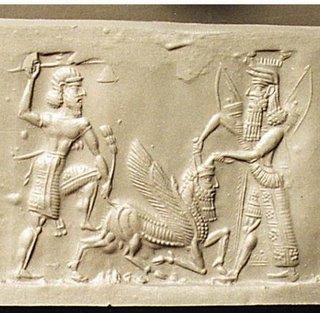Why is Jack Twist beaten to death in
Brokeback Mountain? The answer that it's because he's gay is inadequate. Plenty of gay men, even in Texas, got by on the sly or by secret relationship, without getting killed. By the time of his death, it is the '80s. Gay rights were on the upswing, even in Texas.
 (The original cowboy lovers, Gilgamesh and Enkidu, tame the Bull of Heaven, 7th Century, B.C.)
(The original cowboy lovers, Gilgamesh and Enkidu, tame the Bull of Heaven, 7th Century, B.C.)
This story conveys something else. It is Ennis' refusal to accept Jack's love, the most passionate love he knows, that ultimately kills Jack. In a way, it kills Ennis as well. He is left alone, bereft, holding his true love only in memory. His grief and Jack's death are heartbreaking.
The number of reviews of this film is staggering. Most of them have nothing but praise for the film, for Ang Lee, and for the actors, all of them. The most repeated point is that this is a universal love story rather than a gay cowboy film.
The film is also about the kind of deep abiding bond between men that writers have praised since the time of
Gilgamesh, or of Plato and Aristotle. The death of Gerald in D.H. Lawrence's
Women In Love is a similar tragedy. Birkin, despite his happy marriage, is left weeping, "He should have loved me. I offered him." Sexual or not, explicit or implicit, love between men is also a universal need.
The truth of this film challenges the prudish view that homosexuality is a sin. Here it is the denial of genuine love that is the sin that brings on the tragic end. "Love is a force of Nature," the ads for the film claim. Such love as this film portrays is as sacred as anything we know. To deny it is morally wrong. Trying to deny it only brings misery and loss to everyone involved.
A number of commentators have pointed out how American this film is. It is the culmination of feelings and revelations that go back to Melville, Whitman, and Mark Twain. It reveals the kind of love Abraham Lincoln felt for Joshua Speed (again, whether sexual or not). Our culture, obsessed with material possession, superficial success, and a narrow understanding of family, has lost touch with our rich heritage. How fascinating it is that this "Western" set in Wyoming, should so hearken back to the heart of Western Culture, from the literature of Homer to the history of Alexander to the Calamus poems of Walt Whitman.
More than all of this, the film is such a fine work of art that it touches us in ways we shall continue to discover. It is ineffable, beyond mere description. Like the blinding of Oedipus, it lets us see into recesses of the psyche we could not see otherwise. It will provoke thought and feelings for many years to come.
--Jameson



